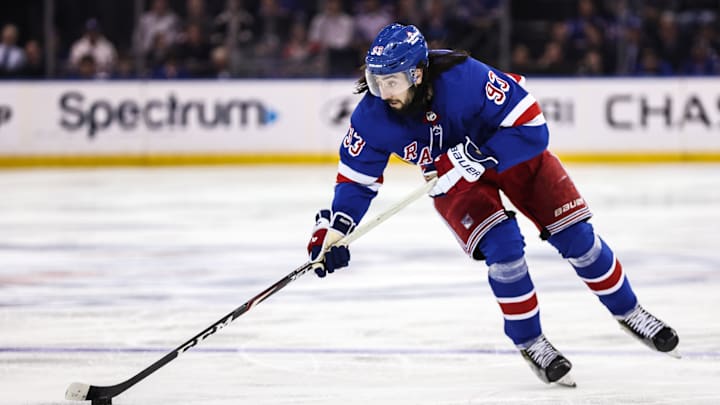After an 82-game slog of ups and downs, the New York Rangers have claimed the President’s Trophy as the NHL’s best regular season team with a 4-0 victory over the Ottawa Senators. With the Capitals’ win on Tuesday night, Peter Laviolette and company know their opponent and can turn their attention to playoff preparation.
The player who needs to take this to heart more than anyone is Mika Zibanejad. The Rangers’ top-line center had a fine season on the surface, posting 26G and 71P in 80 games while playing key roles on both special teams units. However, as any Rangers fan will tell you, this year was a frustrating year for Mika when it came to the eye test. In particular, his precipitous drop off in aggressiveness and confidence was evident on a nightly basis. If the Blueshirts are going to break their 30-year Stanley Cup drought, they will need Zibanejad to raise his game to the occasion.

When Mika scores, the Rangers win
Mika’s recent playoff history is night and day. However, one thing is consistent: when he scores, the Rangers are far more likely to win. In 2022, during the Rangers’ surprise run to the ECF, Zibanejad lead the way with 10G and 24P in 20 games. His scoring touch was critical, scoring eight times in the team’s 10 wins, in contrast to finding the back of the net just twice in their 10 losses. Against Pittsburgh, he did not score until game six, where he put two behind Louis Domingue and then another past Tristan Jarry in the clinching game seven.
In round two versus Carolina, Mika was held off the score sheet in each of the first two games (both losses), but scored in each of the next four (three of them Rangers’ wins) before dishing out three assists in game seven. Finally, facing down Tampa in the Eastern Conference Finals, Zibanejad came out guns blazing, potting a goal in each of the first three games. However, he did not record point for the remainder of the series, and the Rangers lost all three while scoring just one goal in each.
The 2023 playoffs are much more night than day for Mika. Against the Devils, Zibanejad scored just once (in a game six win) and had three assists (only one of them in a loss). Beyond just being unable to score, Mika looked overmatched by New Jersey’s speed and struggled to even put himself in position to score. When he did get chances, he often passed them up in favor of low percentage passes to Chris Kreider or Vladimir Tarasenko. This passive style of play was uncharacteristic, and the Rangers suffered as a result.

Mika needs to find his confidence
Zibanejad’s lack of aggressiveness in last year’s playoffs carried over to this season. He was much less willing to shoot off the rush and often deferred to attempting to pass the puck in 2-on-1 situations. As the season wore on, you could see opposing defenders lean towards defending the pass far more often when Zibanejad was the puck carrier. This was particularly evident when Kreider was the man in transition with him. Part of this may be confidence issue, as his shooting percentage did drop from 13% at even strength last year to 6.7% this year. That drop led to just eight even strength goals, his fewest since his first season in New York when he played just 56 games. Mika also seemed to lose some confidence on the powerplay. While he is known for his howitzer of a one-timer from the top of the left circle, he seemed more tentative this season when it came to turning those shots loose on opposing goalies.
It is hard to say that the Rangers were truly affected by these changes given the season they had, but the playoffs are a much different game. The pace of play slows down and coaches are more willing to shorten their bench. This necessitates teams to have a diverse offensive attack and not rely on one player or line. If Zibanejad is unable to restore his confidence and continues to pass up quality scoring chances, teams will sag off him and aim to shut down other scoring threats.
No Cup without Mika Magic
Last season, it was Artemi Panarin who, despite putting up gaudy point numbers, did not pass the eye test in terms of his overall effect on the game and disappeared in the playoffs. We all know how that ended. This year, it is Mika Zibanejad who is drawing similar criticism. It should be noted that this iteration of the Rangers is more complete than their predecessors and is better equipped to deal with a dry spell (unless that dry spell comes from someone nicknamed “the Breadman”). However, the viability of their 5-on-5 offense is questionable after the vaunted Panarin-Trocheck-Lafrenière line, something that is much tougher to mask come playoffs.
To top it off, if it wasn’t obvious, Zibanejad’s role as the Rangers’ top center is also key here. In looking at the past five Stanley Cup champs, each one had their 1C show out in the playoffs:
2023: Jack Eichel (Golden Knights) 6G, 26P, 22GP
2023: Nathan MacKinnon (Avalanche) 13G, 24P, 20GP
2021: Brayden Point (Lightning) 14G, 23P, 23GP
2020: Brayden Point (Lightning) 14G, 33P, 23GP
2019: Ryan O’Reilly (Blues) 8G, 23P, 26GP
I can guarantee this trend goes back further than five years. The Rangers have their eyes set on the Stanley Cup and will require Mika Zibanejad to return to his peak form in order to get there. If he continues to struggle it might be another bleak offseason on Broadway.
